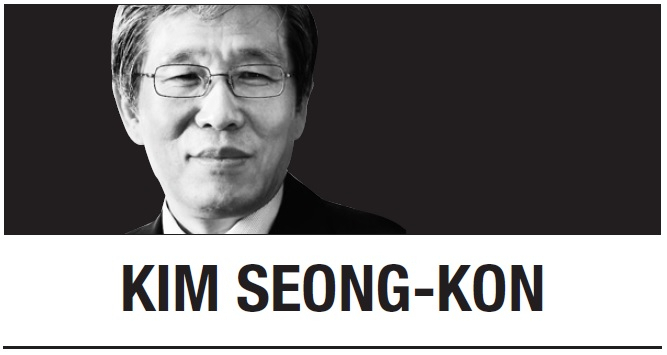
In the eyes of foreigners, Koreans are often said to have many admirable, charming character traits, but one also hears of a few negative ones as well, such as having a “short memory,” “shortsightedness” and a “short temper.” These are often known as the “three S words.”
As for having a “short memory,” it seems generally true that we tend to forget things too easily. For example, we seem to have completely forgotten how we have survived the devastating Korean War, or the atrocities that resulted from ideological clashes, or the postwar poverty. We have also forgotten the invaluable help we have received from other countries in times of crisis. Otherwise, we would not still indulge in ideological warfare. Nor would some of us naively take the side of communist countries, or chant anti-American slogans in front of the US Embassy.
Our short memory also seems to cause marital crises after retirement. Indeed, we completely forget the intense love we fell in with our spouse when we were young. At that time, we could not imagine a life without our beloved better half. As we grow older, however, we forget how precious our lifetime partner has been all these years. Instead, we now see our spouse’s flaws and wrinkles only and even do not want our spouse nearby.
Of course, there are admirable people who faithfully take care of their spouse when they suffer from long-term illness. At the same time, however, some old couples are facing the so-called “divorce at life’s dusk.” If a retired husband stays at home 24-7, meddling in his wife’s personal life, constantly nagging and does not share household chores, he will undoubtedly become an obnoxious nuisance. Some retired husbands even brazenly demand three meals per day, never trying to grab a bite by themselves or cook for their wives.
Recently, a Korean newspaper columnist proposed in his article three things that could overcome the crisis of a retired couple: “personal space,” “compassion” and “sharing household chores.” I could not agree with him more. Still, however, we can surely overcome the “after retirement crisis” if only we “remember” those good old days when we were a loving young couple.
When I was a faculty member at Seoul National University, I noticed that a retired professor still kept regular hours at the Professor Emeritus Building. Thus, one day I asked him why he came to school every day, instead of resting at home. He answered me wryly, chuckling, “Well, my wife doesn’t want me to stay home all day.”
Soon, the professor emeritus passed away. Watching his wife in mourning at the funeral service, I wondered if she had regretted that she did not spend more time with her late husband while he was still with her. Indeed, life is short and when you grow old, you never know when you will lose your spouse.
In American society, you can frequently see old couples strolling on the street, walking beside each other affectionately, hand in hand. It seems that they truly appreciate each other. When young, many Americans break up and end up getting divorced, defying their sacred wedding vows. When old, however, they seem to cherish and treasure each other. Strangely, however, we seem to be doing the opposite.
Another tendency that we should overcome is “shortsightedness.” Indeed, we are often myopic and do not see far enough in a larger perspective. Our previous governments’ myopic decisions and policies may be a good example. For example, our politicians did not see very far ahead and foolishly ruined our relationship with other countries for immediate political gain. They also were so nearsighted that they did not hesitate to send their political enemies to prison. It never occurred to them that they, too, might suffer the same vendetta when and if they lost the next election. Indeed, if you are nearsighted, you cannot see many obvious things that lie ahead.
The same thing applies to our relationships with other people and other countries, too. Our friendships should be long-term relationships, not short-term ones based on the person’s or the country’s usefulness for us. If we use others for personal gain and turn our backs on them as soon as they no longer have use-value, that would be terribly wrong. It would also prove that we are nearsighted. We should always look far ahead because we never know what could happen in the future.
Having a “short temper” is another shortcoming we should overcome. Physical assaults on politicians, for example, mirror our short temper. We cannot attack others simply because they have different opinions. Yet, our short temper makes us perceive them as mortal enemies that need to be eliminated and this makes us mistake terrorism for justice.
We should not be so forgetful. We also should be able to foresee what is ahead of us. Finally, we should put our emotions under control. Then, we can earn “esteem” from other countries.
Kim Seong-kon
Kim Seong-kon is a professor emeritus of English at Seoul National University and a visiting scholar at Dartmouth College. The views expressed here are his own. -- Ed.







